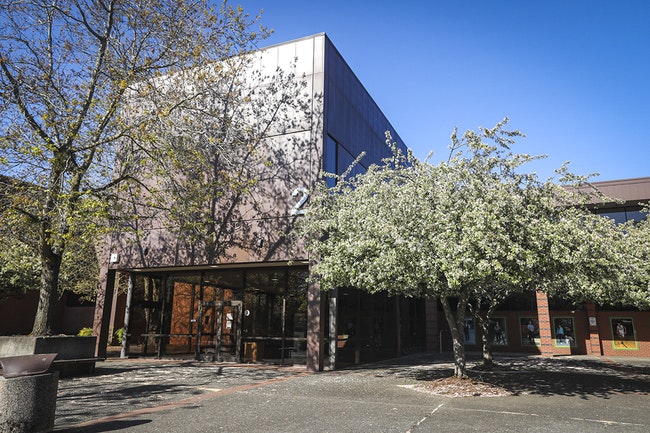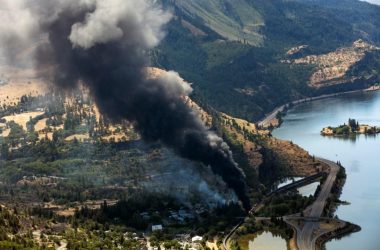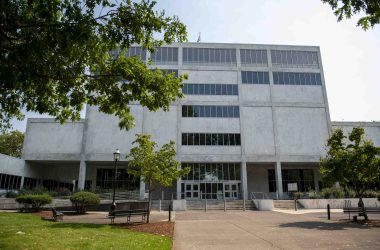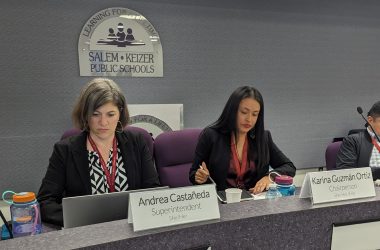 Chemeketa Community College on Thursday, April 16. (Amanda Loman/Salem Reporter)
Chemeketa Community College on Thursday, April 16. (Amanda Loman/Salem Reporter)
NOTE: Salem Reporter is providing free access to its content related to the coronavirus as a community service. Subscriptions are vital to continue this so please sign up today.
Automotive students are working on cars in their driveways.
Viticulture instructors lead wine tasting labs over Zoom.
Library workers mail textbooks free.
At Chemeketa Community College, faculty have gotten creative to keep hands-on learning available to students during the college’s first-ever all-remote term.
They’re doing it facing a steep enrollment drop, which means less money from the state and less tuition revenue, as Oregon heads into a recession which could further jeopardize state funding.
President Jessica Howard said enrollment is down about 20% over last spring, erasing some gains made during the winter. Students can still enroll or drop courses, so the number is fluctuating daily, she said.
Last spring, the college had about 13,500 total students, about half of those attending full-time.
The drop puts the college in a precarious financial position.
“Community colleges are economic first responders in an economic downturn and we are gonna be really, really critical and useful in helping folks get back to work, skill up, all of those things. And we need the capacity to be able to do that. And that’s what I’m most concerned about after we come out of this health crisis,” Howard said.
She’s hoping some of the $14 billion earmarked for colleges and universities in the coronavirus relief package Congress passed in March will help Chemeketa cover budget gaps.
For now, Howard said she’s most concerned about making sure students can still access an education.
Many Chemeketa students don’t have reliable computers or home internet, Howard said. Some may not have a home at all.
Chemeketa has distributed hundreds of laptops to students who need them, and handed out 200 grocery gift cards using money from the college’s foundation. While buildings are closed, the college has also extended wi-fi into the parking lot at its Salem and satellite campuses so students can work in their cars or while sitting outside.
Starting May 4, the college is also offering free courses to high school seniors who have completed their Oregon diplomas, giving them a chance to take one college-level class while they’re waiting for some semblance of normal life to resume.
A number of spring courses that couldn’t be offered remotely have been canceled or pushed to summer term, including driver’s education, and career technical education classes that require hands-on contact like defensive tactics for law enforcement and fire sciences.
Community education classes are all canceled for the spring. Those are non-credit courses where anyone interested can sign up to learn guitar, conversational Russian or Microsoft Excel.
College leaders said they’re pleasantly surprised by the creativity of college instructors adapting to remote teaching.
A horticulture instructor sent students home with plants and seeds to work on gardening, said Holly Nelson, executive dean of academic progress and regional education services.
Don Brase, Chemeketa’s dean of general education and transfer studies, said science and arts courses have been more difficult to move online. Scheduled sculpture and ceramics courses were canceled, he said, but otherwise instructors have adapted by sending materials home.
Jay Gipson-King, a theater instructor, is teaching an introduction to theater course and acting this spring. The introductory course is lecture-based and translated well online. But he said teaching acting is difficult, even with a focus on monologues and making audition tapes.
“It’s not the same. And everybody knows that,” he said.
He said the college has managed the transition about as well as possible, but it’s still a challenge for students and faculty.
“Students have to manage their own time in a way that’s more challenging than in a face to face class,” he said.
Some chemistry labs adjusted so students could work at home with common household items rather than having dangerous chemicals they would use in class.
Biology instructor Jessica Schrunk has modified lab exercises so students can do them at home. For her plant biology course this week, students are assigned to find mosses and other plants to identify, though she won’t penalize those who don’t have the option to go outside.
“One of the things we’re really doing across the board is remembering not everybody’s in the same situation,” she said.
Her colleague Shannon Othus-Gault, a geology and earth sciences instructor, created a website with virtual field trips to geologic sites in Oregon like Crater Lake and Smith Rock State Park. Othus-Gault has also tried to create assignments her students can do with their children out on walks so parents don’t have to choose between their own education and spending time with kids.
Both said the hours they’re working have increased dramatically since the shift. Faculty had just two weeks to convert courses normally taught in person to an online format before the start of the spring quarter on April 6.
They’ve worked hard to adapt courses so expectations are the same week to week: several video lectures with a worksheet and labs. But with no face-to-face contact with students, they feel compelled to answer by email queries as students run into problems, even if it’s at 11 p.m. on a Saturday.
“You have these problems and you get frustrated. And the frustration is not necessarily with the computer. It’s with me. So I’m trying to get to it as quickly as possible,” Othus-Gault said.
“Because we have no contact besides virtual contact, it’s a lot more,” Schrunk said.
Brase said communication has been a challenge for both students and faculty used to seeing each other in person.
“Instructors are trying to figure out how their office hours work, how to connect with the students and response time,” he said.
Brase said he and other college leaders are paying close attention to student feedback and quickly addressing concerns about accessing material or instructors online.
“We’re listening very carefully,” he said.
Though many career and technical education classes depend on hands-on instruction, Johnny Mack, the college’s CTE director, said enrollment for them is down about 12% over last spring, less than the college as a whole.
Some students, like those in nursing and manufacturing, can continue switch to computer simulations, he said. Others, like automotive, have gotten creative with at-home work.
Students in some medical courses couldn’t complete clinical placements required to earn a degree, he said, because most medical offices have shut down or limited in-person appointments and outside visitors.
They’re planning to do in-person labs in May and June for courses like emergency medical technician, Mack said. Students will work one-on-one with instructors,following social distancing guidelines to minimize contact.
Howard said Chemeketa is planning to teach summer term in remote mode as well, with the exception of some courses that require hands-on activities. She’s hopeful by then the college can have students on campus in small groups for limited instruction.
College leaders have not yet decided whether to stay remote for fall term, she said, though it’s possible it will be nearly all online too.
“We’re all trying to figure this out,” Howard said.
Contact reporter Rachel Alexander: [email protected] or 503-575-1241.

Rachel Alexander is Salem Reporter’s managing editor. She joined Salem Reporter when it was founded in 2018 and covers city news, education, nonprofits and a little bit of everything else. She’s been a journalist in Oregon and Washington for a decade. Outside of work, she’s a skater and board member with Salem’s Cherry City Roller Derby and can often be found with her nose buried in a book.









